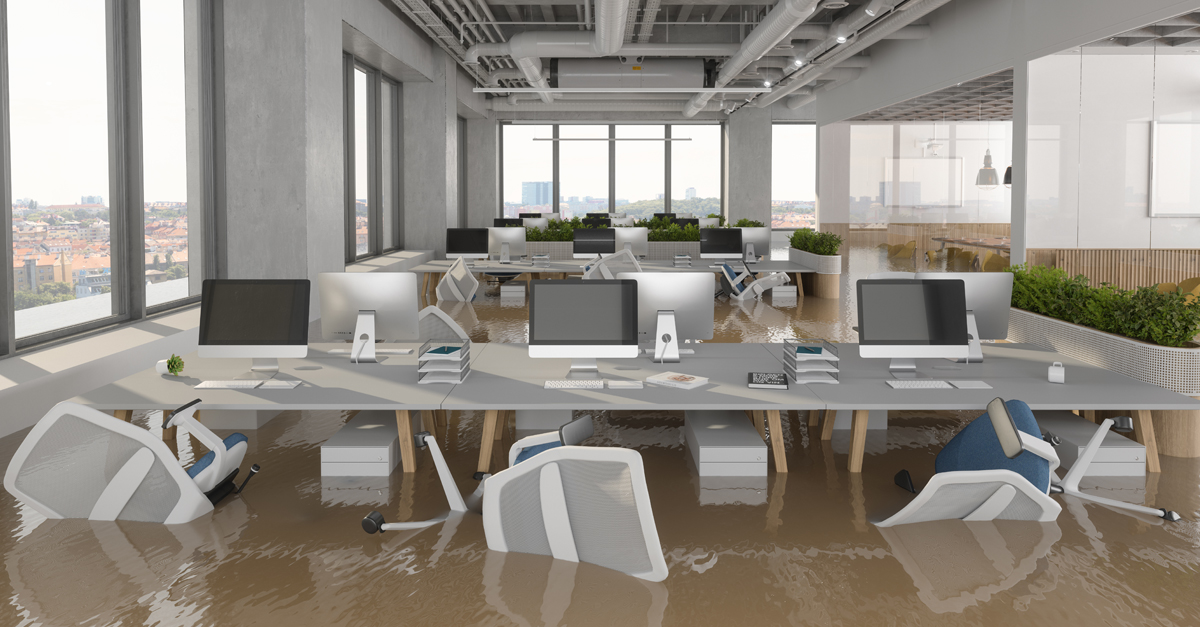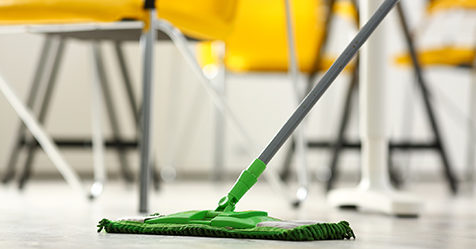Water damage can wreak havoc on commercial properties, leading to significant financial losses and operational disruptions. Understanding the six primary causes of water damage and implementing preventative measures will help facility managers safeguard investments and ensure business continuity.
1. Plumbing and sprinkler system issues
One of the most common causes of water damage in commercial properties is plumbing and sprinkler system failure, often resulting from unnoticed leaks or damage to sprinkler heads. Corrosion from humidity in coastal areas and damage from freezing temperatures in colder regions exacerbate these issues.
Prevention tips:
- Conduct regular inspections and maintenance of plumbing and sprinkler systems.
- Monitor for signs of wear and tear, especially at connecting joints and elbows.
- Educate tenants and staff on how to avoid damaging sprinkler systems.
In the event of a plumbing or sprinkler failure, swift action is critical. Addressing one weak point may reveal other vulnerabilities, necessitating comprehensive repairs or repiping
2. Roof leaks
Flat roofs on commercial buildings are susceptible to water pooling and leaks. Deferred maintenance often leads to water damage, as water infiltrates the building through the path of least resistance.
Prevention tips:
- Schedule regular professional roof inspections to identify and repair cracks and missing shingles.
- Ensure proper drainage to prevent water accumulation.
If a roof leak occurs, take immediate action by covering the openings with tarps and beginning interior drying processes to prevent further damage and mold growth.
3. HVAC system failures
HVAC systems, particularly those installed on rooftops, are prone to leaks if not properly maintained. Issues like condensation buildup and improperly closed fire dampers can cause significant water damage.
Prevention Tips:
- Conduct regular HVAC system maintenance to check for leaks and ensure proper functioning of condensation drains.
- Keep filters clean and perform routine checks to prevent malfunctions.
4. Drainage problems
Clogged or malfunctioning drainage systems can lead to significant water damage. Proper landscaping practices and regular cleaning of gutters and downspouts will help ensure effective drainage.
Prevention tips:
- Regularly clean and inspect gutters, downspouts, and drainage systems.
- Implement proper landscaping and grading around the building to direct water away from the foundation.
In areas with high water tables, more complex drainage systems and regular maintenance of French drains and pumps are necessary to manage excess water.
5. Appliance failures
Failures in appliances that are connected to waterlines—such as water heaters, dishwashers and refrigerators—are another common source of water damage. Regular maintenance can prevent many of these issues.
Prevention tips:
- Conduct routine inspections of hoses and fittings for signs of wear and corrosion.
- Replace damaged components promptly to prevent leaks.
In the event of an appliance failure, immediately shut off the water supply and begin extraction and drying procedures.
6. Sewer backups
Maintaining sewer lines—whether connected to a septic system or the city’s sewer system—is challenging. Backups can cause severe damage due to contaminated water.
Prevention tips:
- Establish a maintenance plan with a septic company based on usage and system capacity.
- Provide waste baskets for items that frequently clog pipes.
In the event of a sewer backup, prioritize safety and use appropriate personal protective equipment (PPE) during cleanup. Follow hygiene and sanitation guidelines to prevent health hazards.
Proactive maintenance and emergency response
To minimize the risk of water damage, establish a proactive maintenance schedule covering all potential problem areas, including plumbing, roofing, HVAC systems, and appliances. Make sure your quarterly maintenance plan includes inspections of common points, foundational cracks, window caulking, and the roof.
If you see an emergency during an inspection:
- Immediately stop the source of water intrusion, such as by shutting off the water mains.
- Avoid direct contact with sewage water and call a professional cleanup company.
- Have an emergency response plan that includes contact information for electricians, plumbers, and HVAC technicians.
- Ensure the alarm system is functioning so you can respond quickly to a leak and avoid your property becoming uninhabitable.
Once you have removed the water, focus on repairing damaged materials and documenting the extent of the damage for insurance claims. Make sure you understand the details of your flood insurance coverage and its limits, and whether your area requires a special flooding policy from the Federal Emergency Management Agency (FEMA). This knowledge can help you effectively manage water damage incidents.
Hiring certified water damage restoration professionals will also help ensure thorough insurance remediation, allowing you to make the necessary repairs so the commercial property can get back to business.




